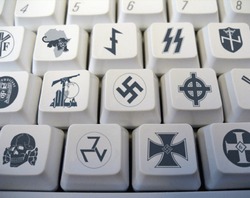
NOTE: My excellent friends have pointed out to me that this blog has elements of cultural appropriation, that there are embedded assumptions about French culture being similar to US culture... and also a failure to acknowledge that the US does not have a national satire publication in any way comparable to Charlie Hebdo. I consider these criticisms of my blog just, and I thought about taking down the blog, but I decided to leave it up and here is why: This is a sharing of my process around these issues... and this is part of that process. Obviously, I am relating the current controversy to my own experiences, and in doing that, crossed the line into appropriation. It may be more instructive to leave it as an example than to take it down altogether.
The Charlie Hebdo murders have triggered debate about free speech, hate speech and censorship... and in attempting, to sort out my own position, I felt a need to educate myself a little more about legal definitions. And I am blogging some of my process, on the off-chance that some of my readers might be seeking more clarity, too. So here goes:
Hate speech. Well, there is a broad definition of hate speech, but what I want to hone in on is the definition of the kind of hate speech that is against the law in the US. We all know about the First Amendment:
“Congress shall make no law respecting an establishment of religion, or prohibiting the free exercise thereof, or abridging the freedom of speech, or of the press, or the right of the people peaceably to assemble, and to petition the Government for a redress of grievances.”
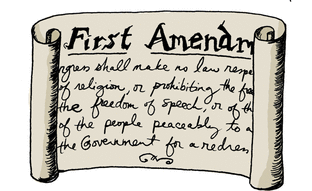
I know… your eyes are glazing over. Bear with me. When the Supreme Court upholds a legal decision made in a lesser court, it sets a precedent that can permanently alter the way the Constitution is interpreted for the rest of the country.
How does this relate to that very tricky line between free speech and hate speech?
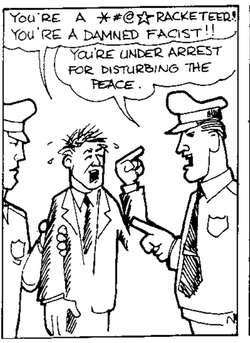 Offensive Conduct in New Hampshire
Offensive Conduct in New Hampshire In 1942, there was a very angry Jehovah’s Witness preaching and passing out pamphlets on the sidewalk of a town in New Hampshire. He was calling other religions “rackets.” He was in the process of being detained by a police officer, when he spotted a town marshall. Turning to him, he shouted that the man was a “God-damned racketeer” and “a damned Fascist.” So then he was officially arrested and found guilty under something with the quaint name of “New Hampshire's Offensive Conduct Law.” This law states that it is illegal for anyone to address “any offensive, derisive or annoying word to anyone who is lawfully in any street or public place ... or to call him by an offensive or derisive name.”
The Jehovah’s Witness cried foul and took the case to the Supreme Court. Now, remember, this was 1942, which probably had something to do with their decision. The Supreme Court unanimously upheld the conviction and the New Hampshire law that was behind it.
This is what they said:
“There are certain well-defined and narrowly limited classes of speech, the prevention and punishment of which have never been thought to raise any constitutional problem. These include the lewd and obscene, the profane, the libelous, and the insulting or 'fighting’ words, those which by their very utterance inflict injury or tend to incite an immediate breach of the peace. It has been well observed that such utterances are no essential part of any exposition of ideas, and are of such slight social value as a step to truth that any benefit that may be derived from them is clearly outweighed by the social interest in order and morality.”
… and that has, more or less, set the tone for interpretation of First Amendment rights.
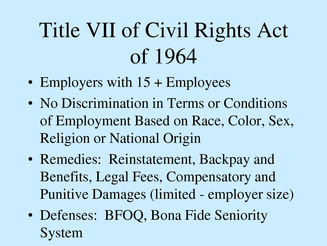
In other words, if you want to have someone arrested for hate speech, the burden falls on the plaintiff to prove that the speech posed an imminent—as in “near, fast-approaching”—threat of causing something illegal to take place.
But, there’s another way to come at the hate speech thing. In 1962 the Civil Rights Act was passed, and Title VII “prohibits employment discrimination based on race, color, religion, sex and national origin.”
FURTHERMORE... The courts have found that harassment based on race, color, religion, sex and national origin constitutes a form of employment discrimination, and some cases against hate speech in the work environment have been successfully prosecuted as a form of harassment.
Hold that thought for a minute. I'm going to digress:
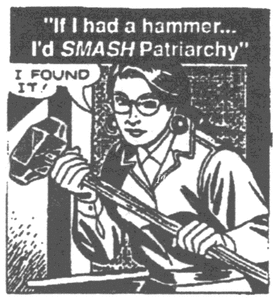
Dworkin and MacKinnon wanted to reframe the issue not as one of censorship, but one of civil rights. To this day, many people remain confused about this. Here it is in a nutshell: The Antipornography Civil Rights Ordinance defined pornography as a civil rights violation against women, and allowed women who had been harmed by pornography to sue the producers and distributors in civil court for damages.
In other words, the ordinance did not call for any banning of pornographic material. It simply gave women the right to their day in court to make the case that they had been directly harmed—that their civil rights had been violated—by pornography. The pornographers were free to defend their material against the charges.
The ordinance was almost immediately overturned by an appeals court on the grounds of violation of First Amendment rights.
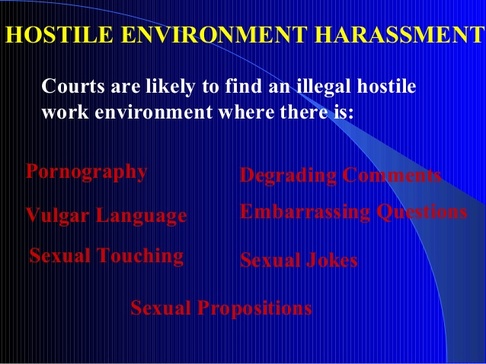
Well… I find it interesting that the courts have upheld the presence of pornography in the workplace to constitute a form of harassment that results in illegal discrimination.
This is from Robinson v. Jacksonville Shipyards:
“Pornography on an employer's wall or desk communicates a message about the way he views women, a view strikingly at odds with the way women wish to be viewed in the workplace. . . . It may communicate that women should be the objects of sexual aggression, that they are submissive slaves to male desires, or that their most salient and desirable attributes are sexual. . . . All of the views to some extent detract from the image most women in the workplace would like to project: that of the professional, credible coworker."
The court concluded that such an atmosphere deters women from entering or remaining in a profession and is “no less destructive to and offensive to workplace equality than a sign declaring 'Men Only.'”
Oh, and what about my workplace, as a lesbian playwright? I am certainly not getting equal pay, access to equal employment opportunity. And, yes, pornography absolutely is a factor in the censorship and discrimination I experience. If the infamous McKinnon/Dworkin Ordinance were law, I would love to lay out my case about how pornography infringed my civil rights. Sadly, the ACLU would probably be on the wrong side of the aisle.
Why am I writing about this? Because the Charlie Hebdo murders are in the news this week, and the widespread publication of the provocative cartoon covers of the magazine has raised a lot of debate about what constitutes satire and what constitutes hate speech.
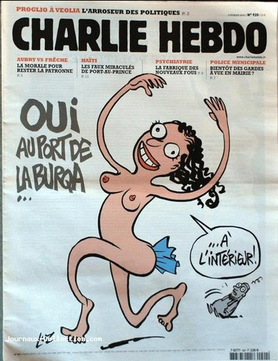 Charlie Hebdo cartoon on the "burqa ban"
Charlie Hebdo cartoon on the "burqa ban" Looking at the Hebdo covers, I certainly think I could argue for their illegality.
Of course, at this point, the issue for publications in France like Charlie Hebdo, is one of self-censorship as a result of horrific violence.
That’s a sobering thought. I am remembering how belle hooks referred to poverty as “slow-motion violence,” and how that threat of slow-motion violence has been the cause of all those theaters and publishers self-censoring when it came to considering lesbian-themed work. There’s not much that can be done when people are frightened of consequences. [And in case you think I exaggerate, one non-profit that produced my work lost 1/3 of their mailing list immediately. Yeah, it's a real thing.]
 Muslim woman attacked in Paris for wearing hajib.
Muslim woman attacked in Paris for wearing hajib. In sum: The legal protections of "freedom of speech" have not protected me from censorship, or threats of violence when I exercised those freedoms. The communities with whom I identify are severely curtailed in their right to express themselves. I have first-hand experience of the harms of pornography, and I also have an understanding of how "freedom of speech" has been exploited by dominant cultures to silence and undermine the rights of minority cultures. The examples of the Third Reich and the KKK's decades-long reign of terror stand out in my mind.
I am less concerned about the privileges of those in power than the vulnerabilities of those without access to resources. This is my position: If, as a response to the events of this week, you are flaunting a "Je Suis Charlie" button in patriotic support of the First Amendment , I encourage you to embrace just as vehemently advocacy for the civil rights of those who are endangered by the protected hate speech of the dominant culture. Otherwise, your credibility might be at risk.

 RSS Feed
RSS Feed
